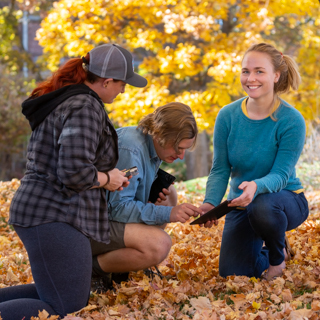How to Get Involved
There are many ways to get involved in research and creative scholarship, and students often pursue different options at different points in their time at UM. These options allow you to find an opportunity that is responsive to your financial, time, and academic credit needs, as well as your interests and career goals.
Options
In an individual research project, you will work with a faculty mentor to develop and refine a research project based on your passions and interests. You can receive academic credit for your project by discussing the option to register for Undergraduate Research, Senior Thesis, or Independent Study credits with your mentor.
Before you approach faculty, take time to read more about developing your interests and preparing to meet with faculty.
Interested in completing a senior thesis? Read our guide with important tips, timelines, and considerations.
Assisting a faculty member or graduate student with an existing project is an excellent way to learn research skills, develop relationships with potential mentors, and be part of a research team. Faculty or graduate students may have funding to hire you (including through work study), or you may work on the project as a volunteer. As a research assistant, you will typically be assisting on a project or supporting the research group rather than working on your own study (although you may be inspired to build a future project based on your RA experiences).
A number of courses at UM focus on research and creative scholarship as part of the in-class experience. These are an excellent opportunity to learn skills you’ll need to pursue projects you are interested in, learn about contemporary topics in your field, and produce original work, often as part of your required coursework and with guidance and feedback from faculty. Check with your academic advisor and faculty to see which courses make the most sense for you to participate in.
Structured research opportunities typically require a competitive application and have a defined start and end date. Participants are often paid a small stipend and receive both experience in their field and additional skills or career training. Examples of formal programs include NSF Research Experiences for Undergraduates (REU), the Flathead Lake Biological Station summer internship program, and Montana INBRE Visiting Undergraduate Scholars.
An internship is an opportunity for practical application of classroom learning through professional, career-related work experiences. All interns have a set of learning objectives, a faculty advisor, and site supervisor. Internships are eligible for academic credit. Some but not all internships include research and creative scholarship; for those that do, you may either have the opportunity to develop your own project or be working in a supporting research assistant position. UM’s Experiential Learning and Career Success (ELCS) department offers advising appointments and resources to help connect you with an internship.
